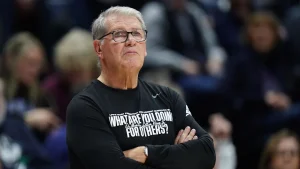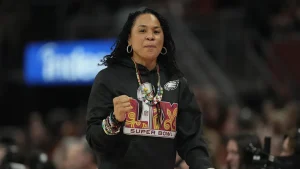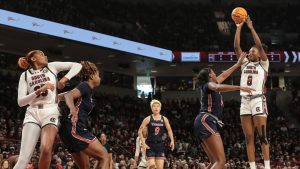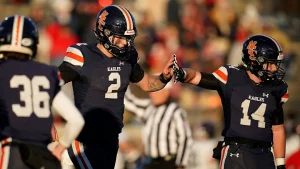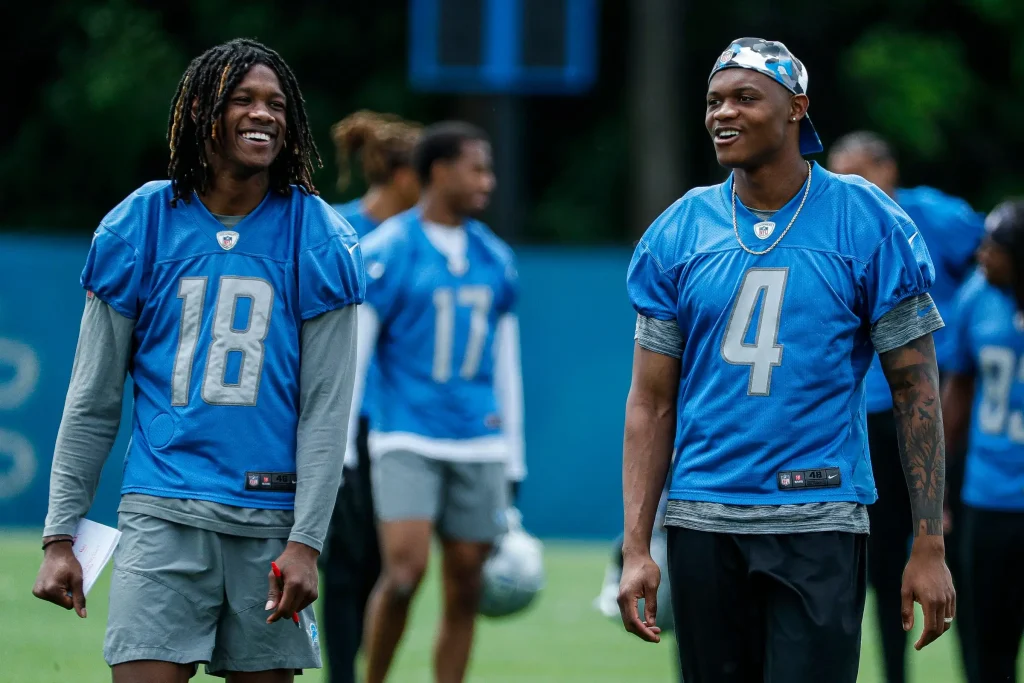
Reasons for the Detroit Lions’ Exclusion from Super Bowl 59
Introduction
The Detroit Lions have long been a team in the National Football League (NFL) that has struggled to break through into elite status. Despite having flashes of brilliance over the years, the team has historically had trouble securing championships and consistently reaching the postseason. As the NFL season progressed in 2024, many experts and fans believed that this might finally be the year the Lions make it to the Super Bowl. With a talented roster and strong regular-season performances, the Lions seemed to have everything needed to make a deep playoff run. However, the team’s exclusion from Super Bowl 59 was a bitter pill to swallow for the organization, players, and fanbase alike. So, why didn’t the Detroit Lions reach Super Bowl 59? To understand this, we need to explore the various reasons that contributed to their failure to secure a spot.
Regular Season Performance
The 2024 NFL season was one of the best regular-season campaigns in recent memory for the Detroit Lions. Finishing the season with a remarkable 15-2 record, they were one of the top teams in the NFL. The Lions’ offense, led by quarterback Jared Goff and offensive coordinator Ben Johnson, was firing on all cylinders. Goff’s connection with his receiving corps, including star wide receiver Amon-Ra St. Brown, was incredibly productive. The running back committee, led by David Montgomery and rookie Jahmyr Gibbs, provided a solid rushing attack that kept defenses on their toes.
In addition, the Lions’ defense showed significant improvement, with young playmakers like Aidan Hutchinson and James Houston creating pressure on opposing quarterbacks. The secondary, although not the most dominant in the league, played disciplined football, limiting big plays. On paper, it looked like the Lions had a balanced and well-coached team that could compete with anyone in the NFL.
Despite their strong regular-season performance, the Lions faced a number of challenges as they headed into the postseason, which ultimately contributed to their exclusion from Super Bowl 59.
Playoff Push: The Importance of Momentum
Entering the playoffs as one of the top seeds in the NFC, the Lions had momentum on their side. However, the NFL postseason is an entirely different beast compared to the regular season. Teams that might have struggled throughout the regular season can suddenly catch fire in the playoffs, while those that have been successful during the year may falter under the intense pressure of elimination football.
For the Lions, this proved to be the case. Despite having one of the best records in the league, the Lions failed to maintain their regular-season success once the playoffs began. Their first playoff opponent, the Washington Commanders, was a team that had flown under the radar during the regular season but was more than capable of springing an upset.
The Lions were heavily favored in this game, but an underwhelming performance, especially in key moments, allowed the Commanders to capitalize on mistakes. The Commanders’ defense was able to stymie the Lions’ high-powered offense, while their offense was efficient enough to take advantage of turnovers and capitalize on key opportunities. The Lions’ inability to capitalize on their strengths—particularly their passing game—was a major reason for their early exit from the playoffs.
Injuries: A Key Factor in the Lions’ Decline
One of the biggest reasons the Detroit Lions were excluded from Super Bowl 59 was the toll that injuries took on their roster, especially on defense. The Lions were dealing with injuries to several key players heading into the postseason, which weakened their chances significantly.
Defensive Injuries
The Lions’ defense had been one of their biggest strengths during the regular season, thanks in large part to young playmakers such as Aidan Hutchinson, who had been one of the most dominant edge rushers in the NFL in 2024. Hutchinson, who had a breakout season, was expected to be a major factor in the postseason. However, the defense suffered injuries that limited his impact.
In addition to Hutchinson, linebacker Derrick Barnes, who had developed into a reliable tackler and pass rusher, was also sidelined with an injury. These injuries left significant holes in the Lions’ defense, which struggled to pressure opposing quarterbacks and defend against the run.
The absence of Carlton Davis III, a key cornerback, was also a major blow. The Lions’ secondary had been susceptible to big plays throughout the season, and Davis was supposed to be the anchor in the backfield. Without him, the Lions were forced to rely on unproven players, and the result was an inability to contain top-tier wide receivers.
While injuries are a part of the game, they severely hurt the Lions’ chances of success in the postseason. Against an explosive offense like the Washington Commanders, the Lions could not afford to be without key defensive players, and it showed in their early playoff exit.
Turnovers and Mistakes: A Critical Issue
Another major factor contributing to the Lions’ exclusion from Super Bowl 59 was their inability to protect the football and avoid critical mistakes. In their playoff loss to the Washington Commanders, the Lions committed five turnovers—an insurmountable number in a high-stakes playoff game.
Turnovers are one of the quickest ways to lose a football game, and this was certainly the case for the Lions. Quarterback Jared Goff, who had been efficient all season long, threw two costly interceptions that gave the Commanders prime field position. Additionally, the Lions fumbled the ball three times, losing two of them. These turnovers allowed Washington to score easy points and kept the Lions’ offense from gaining any consistent rhythm.
While turnovers are often the result of mistakes made by individual players, they can also be symptomatic of larger issues within the team. The Lions’ offensive line, which had been solid during the regular season, allowed pressure on Goff, leading to rushed throws and poor decision-making. Moreover, the Lions’ special teams contributed to the mistakes with a muffed punt that led to another scoring opportunity for Washington.
These errors were too much to overcome in a high-pressure playoff game. In a contest where every possession counts, turning the ball over five times is simply unacceptable, and it ultimately led to the Lions’ elimination from the postseason.
Coaching Decisions and Game Management
Another aspect of the Lions’ failure to reach Super Bowl 59 was questionable coaching decisions during their playoff game. While head coach Dan Campbell had been praised for his leadership and ability to motivate his players, some of his in-game decisions were called into question during the playoff loss.
One of the most notable decisions was Campbell’s decision-making on fourth down situations. Throughout the game, the Lions’ offense stalled multiple times in the red zone, and Campbell faced key fourth-down decisions. Instead of opting for conservative plays to maintain possession or rely on the kicking game, Campbell chose to go for it in high-risk situations. While aggressive play-calling is often praised, it backfired in this instance, as the Lions failed to convert on multiple crucial fourth downs. These failed attempts gave Washington valuable field position and allowed the Commanders to control the tempo of the game.
Additionally, the Lions’ defense, which had already been hampered by injuries, struggled with game management. The defensive playcalling seemed unable to adjust to Washington’s offensive strategies. The Lions’ defensive coordinator, Aaron Glenn, was criticized for not making more adjustments to shut down the Commanders’ passing game, which was able to find success even without star quarterback Sam Howell playing at his best.
The Washington Commanders: An Underestimated Opponent
While much of the focus has been on the Lions’ shortcomings, it is important to acknowledge the strength of their opponent in the playoff game—the Washington Commanders. Led by head coach Ron Rivera, the Commanders were a team that had been overlooked by many throughout the season. Despite their struggles early in the year, the team had built momentum in the second half of the season and were firing on all cylinders by the time they faced the Lions.
The Commanders had a stout defensive line, led by Montez Sweat and Chase Young, which was able to disrupt the Lions’ offensive flow. Washington also had a solid running back committee and was able to control the clock effectively, which limited the Lions’ opportunities to score. While the Commanders were not considered among the top Super Bowl contenders, they were a well-coached and disciplined team capable of exploiting the Lions’ weaknesses.
The Detroit Lions’ exclusion from Super Bowl 59 was a result of multiple factors that contributed to their early playoff exit. Despite a stellar regular season, key injuries to defensive players, critical turnovers, and questionable coaching decisions derailed the Lions’ postseason hopes. The Washington Commanders, while not a favorite, played a disciplined and opportunistic game, capitalizing on the Lions’ mistakes and advancing to the next round.
While it was a disappointing outcome for the Lions and their fans, the team’s performance throughout the 2024 season showed that they are on the rise. With a young and talented roster, the Lions have the potential to make future Super Bowl runs. However, in order to achieve that goal, they will need to learn from their mistakes and continue to build upon the foundation that they have established in the past season.
